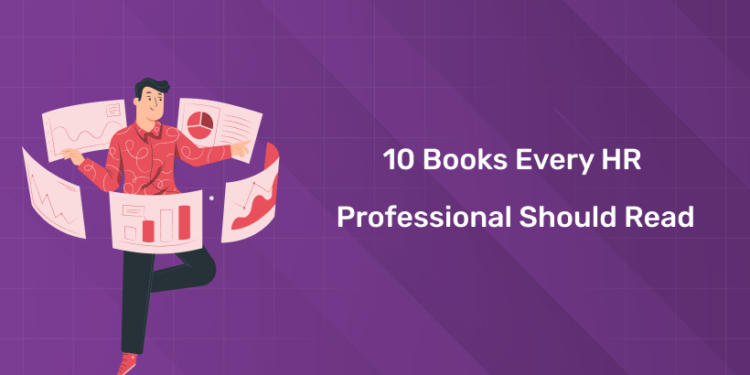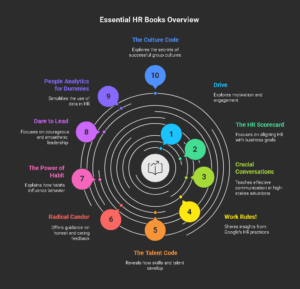Table of Contents
Introduction
HR professionals design the workplace. They make decisions regarding hiring, culture, and growth. The need to keep growing. Books penetrate the human psyche, strategy, management…everything. These give practical assistance in dealing with issues of retention, diversity, and compliance. Reading fosters competence and confidence. This post contains a list of 10 essential HR professional books. Each has something unique to offer, such as insight into motivation, or how to make data-driven decisions. These titles were selected because they are clear, relevant, and impactful. They prepare HR professionals who read them to be successful. Explore this list for books that will change the way you think and keep you at the cutting edge in your field.
Is being an HR your dream? Enrol now for our course on Human Resource!
Why HR Professionals Must Read Regularly
HR demands are complex. They handle the talent, the conflicts, and the legalities. The workplace is changing rapidly. Technology, employee expectations, and regulations are constantly in flux, producing new trends. Reading helps keep skills “hot”. Books provide tested strategies, and expert opinions. They disclose how to motivate teams, increase engagement and problem solve. Reading regularly hones Critical Thinking skills. It also builds knowledge of psychology, leadership, and business. HR without that runs the risk of being left behind. Books also provide ideas for improved policies and practices. They offer frameworks for addressing problems such as burnout or inclusion. It keeps HR professionals knowledgeable in order to be trusted advisors. It prepares them to have difficult conversations and to be successful in the organization. To commit to books is to commit to growth.
Become an HR Expert – Enroll in Our HR Management Course Today!
Unlock the secrets to effective Human Resource Management with our expert-led course! Learn recruitment, employee relations, performance management, and more to build a thriving workplace. Start your journey toward a successful HR career today!
Know MoreTop 10 Must-Read HR Books
1. Drive: The Surprising Truth About What Motivates Us by Daniel H. Pink
Motivation powers performance. Pink’s book explores what truly inspires people. It challenges outdated reward systems. Research shows intrinsic motivation outperforms cash incentives. HR professionals learn to create environments where employees thrive. The book uses studies and stories to explain autonomy, mastery, and purpose. These concepts help design better workplace policies. For example, offering growth opportunities boosts retention. Pink’s clear writing makes complex ideas simple. HR professionals will find tools to increase engagement and productivity. This book is a must for understanding human drive.
2. The HR Scorecard: Linking People, Strategy, and Performance by Brian E. Becker, Mark A. Huselid, and Dave Ulrich
HR needs measurable impact. This book shows how to align HR with business goals. It introduces the HR Scorecard, a tool to track performance. Metrics like turnover rates and training effectiveness become clear. The authors use case studies to prove HR’s value. HR professionals learn to justify budgets and initiatives. The book’s practical approach helps create data-driven strategies. It emphasizes accountability in HR practices. Readers gain skills to connect hiring and training to profits. This is essential for HR professionals aiming to influence leadership.
3. Crucial Conversations: Tools for Talking When Stakes Are High by Kerry Patterson, Joseph Grenny, Ron McMillan, and Al Switzler
Tough talks define HR. This book teaches how to handle high-stakes discussions. It offers a framework for clear, respectful communication. HR professionals deal with conflicts, firings, and feedback daily. The book’s techniques ensure these moments build trust, not tension. Real-life examples show how to stay calm and focused. Readers learn to listen actively and speak persuasively. These skills improve employee relations and team dynamics. The book’s step-by-step methods are easy to apply. HR professionals will master conversations that shape workplace culture.
4. Work Rules!: Insights from Inside Google That Will Transform How You Live and Lead by Laszlo Bock
Google’s HR practices are legendary. Bock, former Google HR leader, shares their secrets. The book covers hiring, culture, and employee growth. It explains how Google uses data to make decisions. For instance, their hiring process prioritizes skills over degrees. HR professionals learn to build fair, effective systems. The book blends humor with practical advice. It shows how to create a workplace employees love. Bock’s insights apply to any organization, not just tech giants. This book is a goldmine for innovative HR strategies.
5. The Talent Code: Greatness Isn’t Born. It’s Grown. Here’s How. by Daniel Coyle
Talent drives success. Coyle’s book reveals how skills develop. It explores deep practice, coaching, and motivation. HR professionals learn to nurture employee potential. The book uses science and stories from sports, music, and business. It shows how small changes spark big growth. For example, targeted feedback accelerates learning. HR professionals can use these ideas for training programs. The book’s clear examples make it actionable. It helps create systems that build talent, not just hire it. This is key for HR professionals focused on development.
6. Radical Candor: Be a Kick-Ass Boss Without Losing Your Humanity by Kim Scott
Feedback shapes performance. Scott’s book offers a guide to honest, caring communication. It balances praise and criticism. HR professionals learn to give feedback that motivates. The book’s framework prevents harsh or vague critiques. Real-world examples show how to build trust. For instance, addressing issues directly improves team morale. Scott’s experience at Google and Apple adds credibility. HR professionals will find tools to coach managers and employees. This book is vital for creating open, productive workplaces.
7. The Power of Habit: Why We Do What We Do in Life and Business by Charles Duhigg
Habits drive behavior. Duhigg’s book explains how habits form and change. HR professionals can use this to improve workplace culture. The book uses research and stories to show how habits work. For example, small changes in routines boost productivity. HR professionals learn to design better onboarding and training. The book’s insights help address issues like low engagement. Its clear, engaging style makes complex ideas accessible. HR professionals will gain tools to shape employee behavior and drive results.
8. Dare to Lead: Brave Work. Tough Conversations. Whole Hearts. by Brené Brown
Leadership defines HR. Brown’s book focuses on courage and empathy. It shows how to lead with authenticity. HR professionals learn to foster trust and inclusion. The book uses research and stories to teach vulnerability. For example, admitting mistakes builds stronger teams. Brown’s practical tips help HR professionals navigate challenges. These include handling layoffs or diversity issues. The book’s warm, direct style resonates with readers. It equips HR professionals to create supportive, bold workplaces.
9. People Analytics for Dummies by Mike West
Data transforms HR. West’s book simplifies people analytics. It teaches how to use data for hiring, retention, and performance. HR professionals learn to measure what matters. For example, analyzing turnover data reveals retention strategies. The book breaks down complex concepts into clear steps. It includes tools like surveys and dashboards. HR professionals gain skills to make evidence-based decisions. The book’s practical focus ensures quick results. It’s a must for HR professionals aiming to modernize their approach.
10. The Culture Code: The Secrets of Highly Successful Groups by Daniel Coyle
Culture drives success. Coyle’s book reveals how great teams work. It explores trust, collaboration, and communication. HR professionals learn to build strong workplace cultures. The book uses examples from top organizations like Pixar. It shows how small actions create belonging. For instance, open feedback loops boost morale. Coyle writes accessibly and is easy to read. HR’s will find tools for molding positive productive atmospheres. An important book for the development of workplace excellence.
Is being an HR your dream? Enrol now for our course on Human Resource!
Conclusion
HR professionals define the core of any organization. Reading develops the skills to be good at it. The 10 books that I have compiled present practical, proven pathways. They address central HR issues ranging from motivation to analytics. The books are each specific and practical. They are an advantage for HR professionals who have access to them. They learn to hire more intelligent, communicate effectively and develop better cultures. These are not simply “books”; they are “instruments of success.” Begin with just one and see results when you apply what you’ve learned. Dedicate yourself to growing and change your HR practice. Grab a book today and take the lead tomorrow.
Become an HR Expert – Enroll in Our HR Management Course Today!
Unlock the secrets to effective Human Resource Management with our expert-led course! Learn recruitment, employee relations, performance management, and more to build a thriving workplace. Start your journey toward a successful HR career today!
Know MoreFrequently Asked Questions
Why are these specific books recommended for HR professionals?
The 10 books in the blog post address core HR challenges. They cover motivation, communication, culture, and data-driven decisions. For example, Drive by Daniel Pink explains what inspires employees, helping HR create better reward systems. The HR Scorecard shows how to measure HR’s impact on business goals. Each book was chosen for its practical tools and clear insights. HR professionals deal with hiring, retention, and workplace conflicts daily. These books offer proven strategies to handle those tasks. They draw from real-world examples, like Google’s hiring methods or Pixar’s team dynamics. Reading them builds skills to improve employee engagement and organizational success. They’re not random picks—they’re essential for staying sharp in HR.
How can HR professionals find time to read these books with busy schedules?
HR professionals juggle many tasks, but reading is worth the effort. Start by setting aside 15-20 minutes daily. This could be during a commute, lunch break, or before bed. Audio versions of books like Crucial Conversations or The Culture Code allow listening while multitasking. Another approach is to prioritize one book at a time. For example, read Radical Candor first if feedback is a current challenge. Break reading into small chunks, like one chapter per day. Use weekends for deeper dives into books like The HR Scorecard. Joining a book club with other HR professionals can keep you accountable. Reading boosts skills, saves time on trial-and-error, and makes you a better leader. Schedule it like a meeting—it’s that important.
How do these books help HR professionals improve workplace culture?
Workplace culture shapes employee satisfaction and productivity. Books like The Culture Code by Daniel Coyle explain how to build trust and collaboration. Coyle uses examples from top companies to show small actions, like open feedback, create belonging. Work Rules! by Laszlo Bock shares Google’s secrets for a positive culture, like transparent hiring. Dare to Lead by Brené Brown teaches empathy and courage, key for inclusive environments. HR professionals can apply these ideas to design better onboarding or team-building activities. For instance, Brown’s tips on vulnerability help address diversity issues. These books provide clear steps to strengthen culture. They show HR professionals how to foster teams where employees feel valued and motivated.
Can these books help HR professionals who are new to the field?
Yes, these books are ideal for new HR professionals. They break down complex ideas into simple, actionable steps. People Analytics for Dummies by Mike West teaches beginners how to use data without needing a math degree. It covers basics like tracking turnover. Crucial Conversations offers tools for handling tough talks, a common challenge for newcomers. The Talent Code by Daniel Coyle explains how to develop employee skills, perfect for creating training programs. Each book uses real examples, making concepts easy to grasp. New HR professionals gain confidence by applying these strategies. The books also build a strong foundation for understanding motivation, leadership, and culture. They’re practical guides to succeed early in an HR career.
How do these books address modern HR challenges like remote work and diversity?
Modern HR faces unique issues like remote work and diversity. Work Rules! by Laszlo Bock shares Google’s approach to flexible work, useful for managing remote teams. It covers data-driven ways to keep employees engaged. Dare to Lead by Brené Brown emphasizes empathy, critical for inclusive workplaces. Brown’s strategies help HR professionals handle diversity conversations. The Culture Code shows how to build trust in virtual teams through clear communication. People Analytics for Dummies teaches how to use data to spot diversity gaps or remote work issues. These books offer tools to address today’s challenges. HR professionals learn to create fair policies and maintain connection in hybrid settings. The insights are practical and directly applicable.
Are these books relevant for HR professionals in small businesses?
Absolutely, these books apply to small businesses. The HR Scorecard helps small HR teams measure impact with limited resources. It shows how to track metrics like retention on a budget. Radical Candor by Kim Scott teaches feedback skills, vital for small teams where relationships are close. The Power of Habit offers ways to build routines that improve productivity, even in small offices. Drive by Daniel Pink helps design motivation systems without big budgets, like offering growth opportunities. Small businesses often lack large HR departments, so these books provide clear, low-cost strategies. HR professionals in small firms can use them to create strong cultures and efficient processes. The ideas scale to any organization size.
How can HR professionals apply the lessons from these books in daily work?
Each book offers practical tools for daily HR tasks. Crucial Conversations provides a framework for handling conflicts, like resolving team disputes. Practice its listening techniques in meetings. The HR Scorecard teaches how to track metrics, such as training success. Use its methods to report to leadership. The Talent Code shows how to design training that sticks—apply this to onboarding. Radical Candor helps give clear feedback to employees or managers. Try its praise-criticism balance in performance reviews. People Analytics for Dummies offers simple ways to analyze data, like spotting turnover trends. Test one idea per week, like a new hiring question from Work Rules!. These books turn theory into action for HR professionals.
Do these books require prior HR experience to understand?
No prior HR experience is needed. The books are written clearly for all levels. Drive uses simple stories to explain motivation, making it accessible to anyone. People Analytics for Dummies assumes no data knowledge and breaks down concepts like surveys. The Power of Habit uses everyday examples, like Starbucks’ routines, to show behavior change. Crucial Conversations offers step-by-step communication tips anyone can follow. Even complex ideas in The HR Scorecard are explained with case studies. HR professionals, from beginners to veterans, will find value. The books avoid technical terms and focus on practical advice. They’re perfect for anyone wanting to improve HR skills, regardless of background.
How do these books help HR professionals influence senior leadership?
HR professionals must prove their value to leaders. The HR Scorecard shows how to tie HR work to business results, like profits. Use its metrics to make a case for budgets. Work Rules! shares Google’s data-driven HR success, convincing executives with hard evidence. Drive explains why intrinsic motivation beats cash rewards, helping pitch better policies. Dare to Lead equips HR to coach leaders on empathy, strengthening their credibility. Crucial Conversations improves persuasive communication for tough talks with executives. HR professionals can use these books to present clear, data-backed ideas. This builds trust and influence with senior leadership. The books provide tools to speak the language of business success.
What makes these books stand out compared to other HR resources?
These books stand out for their clarity, evidence, and impact. Unlike generic HR guides, they use real-world examples, like Google’s hiring in Work Rules! or Pixar’s culture in The Culture Code. They avoid fluff and focus on actionable strategies. Drive cites research to debunk motivation myths. Radical Candor offers a unique feedback model tested at top firms. People Analytics for Dummies simplifies data for all skill levels. Each book blends science, stories, and practical tips. They’re not just theory—they solve real HR problems like retention or conflict. HR professionals gain tools that work, backed by experts with proven results. These books are the best for lasting impact.











